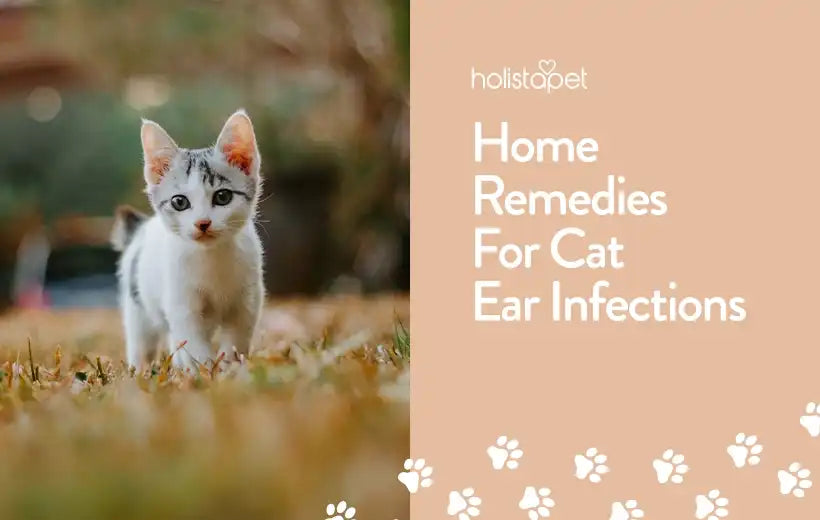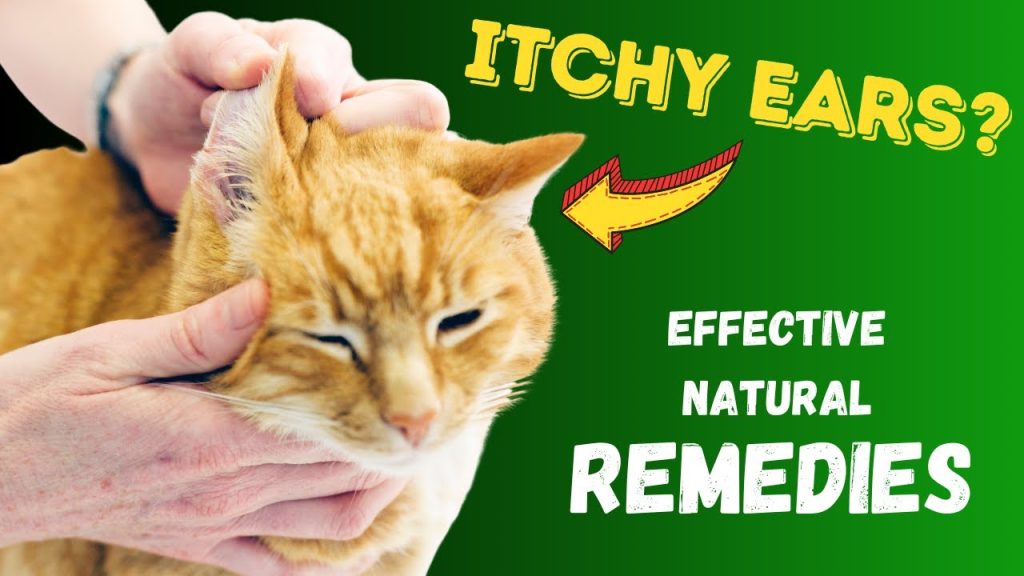Treating a cat ear infection at home may involve gently cleaning the ear with a vet-approved cleaner. Always consult a veterinarian before trying any home remedy.
Cat ear infections can cause discomfort and require prompt attention. Pet owners often seek home remedies to alleviate their feline friend’s pain. It’s crucial to recognize symptoms like ear scratching, head shaking, and odor early. A vet’s guidance is essential, as improper treatment can worsen the condition.
Home care might include cleaning with a solution prescribed by the vet or applying natural remedies like green tea rinses, under professional advice. Remember, a cat’s ear is sensitive, so treatments should be both effective and gentle. Regular check-ups help prevent infections and maintain your cat’s ear health. Stay informed on cat care and always prioritize safety and comfort for your pet.
Introduction To Cat Ear Infections
Cats often suffer from ear infections, a painful and irritating condition. Understanding the symptoms and causes can help pet owners seek timely treatment. Let’s explore the signs and common causes of ear infections in our feline friends.
Signs Your Cat May Have An Ear Infection
- Scratching the ear or area around the ear
- Shaking or tilting of the head
- Odor coming from the ear
- Discharge, often dark and waxy, from the ear
- Redness or swelling inside the ear
- Hearing loss or disorientation
Common Causes Of Ear Infections In Cats
Various factors can lead to ear infections in cats. Some of the most common include:
| Ear Mites | Bacteria | Fungus | Allergies |
|---|---|---|---|
| Tiny parasites that cause intense itching | Can lead to infections if not treated promptly | Yeast infections can be especially stubborn | Environmental or food allergens that inflame the ear |
Initial Steps And Precautions
Initial Steps and Precautions are vital when dealing with a cat’s ear infection at home. Before trying any remedy, understanding the severity of the situation is crucial. Cats can be sensitive, and their ears are delicate. A wrong move can worsen the infection.
When To Visit The Vet
Not all ear infections can be treated at home. Look for these signs:
- Odor coming from the ear
- Discharge of any color
- Excessive scratching or pawing at the ear
- Swelling or redness in the ear canal
- Blood or pus-like fluid
If you notice any of these, contact your vet immediately. Early professional intervention can prevent complications.
Cleaning Your Cat’s Ears: Do’s And Don’ts
| Do’s | Don’ts |
|---|---|
| Use a vet-approved ear cleaner. | Insert cotton swabs into the ear canal. |
| Gently wipe the outer ear with a soft cloth. | Use oils or solutions not meant for cats. |
| Hold your cat securely to prevent injury. | Clean too deeply and cause pain. |
| Massage the base of the ear to help the cleaner work. | Ignore signs of pain or discomfort. |
Remember, always follow the instructions on the ear cleaning solution. Keep sessions short to avoid stress. Reward your cat after each cleaning to create a positive association.
Home Remedies For Cat Ear Infections
Cat ear infections cause discomfort and can lead to more serious issues if untreated.
Home remedies can provide relief while you arrange a vet visit.
It’s vital to know when and how to use these safely.
Warm Compress: Easing Your Cat’s Discomfort
A warm compress can soothe your cat’s ear pain.
Follow these steps for a safe application:
- Heat a cloth with warm water, not hot.
- Wring out excess water.
- Gently apply to your cat’s ear for relief.
- Repeat several times a day as needed.
Herbal Ear Drops: Natural Solutions
Herbal ear drops can be a natural treatment.
Use herbs known for their healing properties.
| Herb | Benefit |
|---|---|
| Calendula | Reduces inflammation |
| Mullein | Alleviates pain |
| Garlic | Antibacterial effects |
Mix these herbs with olive oil.
Let the mixture sit for 24 hours.
Strain it.
Use a dropper to apply a few drops in the affected ear.
Consult a vet before starting treatment.

Credit: www.holistapet.com
Dietary Adjustments For Ear Health
Dietary Adjustments for Ear Health can significantly impact the recovery and prevention of cat ear infections. Proper nutrition strengthens the immune system, aiding in faster healing and potentially reducing the recurrence of infections.
Boosting Immunity With Nutrition
Enhancing your cat’s immune system through diet is crucial. A strong immune system helps fight infections more effectively. Include these key nutrients:
- Vitamin E – Supports skin and ear health.
- Omega-3 fatty acids – Reduce inflammation.
- Antioxidants (Vitamins A and C) – Protect cells.
Consider adding a spoon of flaxseed oil or fish oil to your cat’s food. Both are rich in omega-3s.
Foods To Avoid During Recovery
Certain foods can exacerbate ear conditions or delay recovery. Keep these away from your cat:
- Dairy products – Can increase mucus and inflammation.
- Sugar-heavy foods – Promote yeast growth.
- Processed meats – Often contain harmful additives.
Stick to a balanced, high-quality commercial cat food or a vet-approved home-cooked diet.
Essential Oils: A Natural Antiseptic
Cat owners often seek natural remedies for their pets’ ailments. Essential oils have gained attention for their antiseptic properties. They can help fight infections without harsh chemicals. Yet, it’s crucial to use them safely. This guide will explore how to apply essential oils to your cat’s ear infection with care.
Safe Application Of Essential Oils
- Dilute properly: Always mix essential oils with a carrier oil. This reduces the risk of irritation.
- Avoid sensitive areas: Never apply oils directly inside the ear canal. Instead, gently rub the mixture around the ear.
- Spot test first: Apply a tiny amount on a small skin area. Watch for any adverse reactions over 24 hours.
- Consult a vet: Before trying any home remedy, get your vet’s approval.
Effective Essential Oils For Ear Infections
| Essential Oil | Benefits |
|---|---|
| Tea Tree Oil | Known for its antibacterial properties. |
| Lavender Oil | Helps reduce inflammation and pain. |
| Geranium Oil | Acts as a natural antiseptic. |
| Frankincense Oil | Supports the immune system. |
Remember, cats have a sensitive sense of smell. Use oils in moderation. Essential oils must never replace professional veterinary care.
Massage Techniques For Relief
Cat owners often seek gentle, non-invasive remedies for their pets’ ailments. A common issue cats face is ear infections, which can cause discomfort and pain. A simple yet effective approach is through ear massage, which can provide relief and promote healing. Let’s delve into the massage techniques that could help your feline friend find comfort.
Promoting Healing Through Ear Massage
Ear massage can stimulate circulation and aid in draining excess fluid from your cat’s ears. This can lead to faster recovery. It’s essential to approach your cat calmly to keep them relaxed during the massage.
Step-by-step Guide To Ear Massage
Before starting the massage, ensure your hands are clean to prevent further infection. Follow this guide:
- Confirm ear health: Check for signs of severe infection. If the ear seems very painful, consult a vet.
- Position your cat: Have your cat sit in a comfortable, quiet space.
- Touch gently: Begin by softly stroking the ear, establishing trust.
- Massage the base: Use your fingers to gently massage the base of the ear in circular motions.
- Watch for reactions: If your cat appears to be in pain, stop immediately.
After the massage, reward your cat with their favorite treat. This will help them associate the massage with positive experiences.
Probiotics: Supporting Ear Health From Within
Probiotics support cat ear health from within. These beneficial bacteria help balance the body’s natural microbiome. This balance aids in preventing ear infections by boosting the immune system and reducing inflammation.
The Role Of Probiotics In Ear Infections
Probiotics play a crucial role in maintaining ear health. They do this by:
- Enhancing the immune system to fight infections.
- Reducing inflammation that can cause discomfort and pain.
- Creating a barrier against harmful bacteria.
Administering Probiotics To Your Cat
To effectively administer probiotics to your cat, follow these steps:
- Choose a probiotic supplement designed for cats.
- Mix the probiotic with their food, or give it as a treat.
- Ensure consistent daily dosing to maintain effectiveness.
Consult your vet for the best probiotic and correct dosage.
Monitoring And Maintaining Ear Health
Cats are known for their self-cleaning habits, but when it comes to ear health, they might need a little help from us. Keeping your feline friend’s ears clean and monitoring for signs of infection are key steps in maintaining their overall well-being. Let’s dive into daily checks and ongoing care that can prevent future ear issues.
Daily Checks And Ongoing Care
- Examine your cat’s ears daily for wax buildup, debris, or signs of redness.
- Use a soft, damp cloth to gently wipe the outer ear.
- Avoid inserting anything into the ear canal.
- Keep an eye out for symptoms like scratching, head shaking, or odor.
- For cats prone to ear issues, weekly cleaning with a vet-recommended solution can be beneficial.
Regular vet check-ups ensure early detection and treatment of potential problems. Always consult a vet before trying any new cleaning method.
Preventing Future Ear Infections
- Feed your cat a balanced diet to support immune health.
- Ensure up-to-date vaccinations to prevent certain diseases.
- Regularly check for parasites like fleas and mites that can cause ear issues.
- Maintain routine grooming, especially for breeds with long hair.
- Keep your home clean and dust-free to reduce potential irritants.
By following these preventative steps, you can help your cat avoid the discomfort of ear infections and contribute to their happy, healthy life.
Conclusion: Integrating Home Care With Professional Advice
Effective treatment of cat ear infections often requires a blend of home remedies and vet guidance. This dual approach ensures safety and health for your pet.
The Importance Of Follow-up
Regular check-ups are vital for healing and preventing new issues. After initial treatment, a vet’s evaluation can confirm your cat’s recovery.
Creating A Long-term Ear Health Plan
Partner with your vet to craft a preventive ear care routine. This plan may include:
- Cleaning schedules
- Diet changes
- Regular exams
Such strategies help maintain your cat’s ear health and catch problems early.

Credit: m.youtube.com

Credit: www.holistapet.com
Frequently Asked Questions
How Can I Help My Cat’s Ear Infection At Home?
Consult a vet for proper diagnosis. Clean your cat’s ears gently with a vet-approved cleanser. Avoid inserting anything deep into the ear canal. Keep the ears dry and maintain regular check-ups. Avoid home remedies without veterinary guidance.
Will Peroxide Help Cat Ear Infection?
Peroxide is not recommended for treating cat ear infections as it can irritate the sensitive ear canal. Consult a vet for appropriate medication.
Does Apple Cider Vinegar Help Ear Infections In Cats?
Apple cider vinegar is not a proven remedy for ear infections in cats. Always consult a veterinarian for proper diagnosis and treatment.
What Is The Best Homemade Cat Ear Cleaner?
A simple homemade cat ear cleaner can be made using equal parts of apple cider vinegar and purified water. Gently apply it with a cotton ball to clean the ears.
Conclusion
Dealing with cat ear infections can be stressful, but home remedies offer a gentle solution. Always consult your vet before trying new treatments to ensure your cat’s safety and health. With the right care, you can help your furry friend feel better and prevent future issues.

